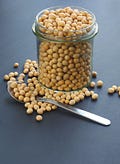When You’re Hot, You’re Hot: Can Soy Really Help Alleviate Hot Flashes?
S(oy) vey. Another hot flash. Can soy really help?
Image by monicasvisuals @pixabay.com
This week, we’re welcoming a new addition to thePause: Roxanne Nelson. Roxanne, who we are crowning our “Medical Maven,” has a strong clinical background as an RN, which helps inform her writing on health and medical subjects. We are grateful for her assistance in helping us un-complicate often complicated health and medical subjects.

For decades, there have been quiet rumblings that women who consume more soy products experience less frequent and/or less severe hot flashes.
Is it true? Is soy the answer to those bothersome, sometimes maddening hot flashes?
First, a brief soy primer:
Soy contains a large concentration of something called isoflavones, which are a type of plant estrogen known as phytoestrogen. Phytoestrogen functions similarly to human estrogen, but with weaker effects.
Because of the ability of soy isoflavones to bind to our body’s estrogen receptors, ingesting soy is thought to help tamp down hot flashes by giving your menopausal body the the estrogen “boost” it needs.
And yet.
Science is like everything else in life: At times confusing, contradictory and cacophonous.
Numerous studies have said that yes, soy can help with hot flashes. As an example, a 2021 study published in The North American Menopause Journal found that “a low-fat, vegan diet and whole soybeans is associated with reduced frequency and severity of hot flashes.”
Other studies have said that soy helps, and that all you have to do is look at Asian women to see why: Women in Asia - who happen to eat a lot of soy products - report less hot flashes. (But is that association really that simple? Uh, no. We’re afraid it’s much more complicated than just that. In fact, we plan to focus on diversity and inclusion in healthcare in a future edition.)
And then there are those that say if the soy is fermented (as in miso, tempeh or soy sauce), it can be digested and absorbed better by your body.
Still other studies that say it all depends on how soy is ingested (are you eating it in whole foods like soybeans or tofu, or are you taking it in supplement form?)
Other research points out that individuals react differently to soy depending on the existing levels of hormones in their bodies at that particular point in time (are you perimenopausal or postmenopausal?)
And to make things even more confusing, there’s this: Some experts caution against the use of soy if you have breast cancer.
Sheryl. As a breast cancer survivor, long ago I abandoned all soy foods, like edamame, tofu and soy milk. That is, until I learned that it’s the soy supplements, not the actual foods containing soy, that might be dangerous in this respect.
Confused yet????!!!!
Yeah, we don’t blame you.
We wish we had a crystal ball and/or were able to comb through the hundreds (maybe thousands?) of deeply intricate studies on soy and hot flashes, and to then dole out specific helpful advice to our readers
But alas, we’re not.
Studies are filled with contradictions and contraindications. Sometimes, not enough women are tested to represent a true sample. Other times, not the right women are studied. And then there are the studies that are anecdotal, meaning that study subjects are reporting based on their personal observations rather than true scientific data.
On and on it goes.
So, we turned to a few authorities to explain from their expert lecterns.
The Medical Maven says:
“Yes, there is controversy about soy, but recent studies have suggested that soy has either a beneficial or neutral effect on various health conditions.
Which basically means this: At worst, soy won’t help your hot flashes. But, for some women, soy be helpful, especially if your symptoms aren’t too severe. Yet, the effect is far more modest than with hormone therapy; it will take a longer time to kick in and for women to feel some relief.”
“This area needs further research as questions remain about a possible benefit of soy. Results are conflicting, potentially due to variation in the types of soy preparations used, the quantities given, and for how long they are used.”
The North American Menopause Society says:
“Eat one or two servings of soy foods daily (containing isoflavones), such as low-fat varieties of tofu, tempeh, soymilk, or roasted soy nuts. Supplements containing soy isoflavones, such as Promensil, reduce hot flashes in some studies.” The North American Menopause Society recommends starting at a dose of 50 milligrams a day (you may need to up the dose to get a benefit).
We say:
Though there may be merit to the thinking that isoflavones in soybeans and soy products help alleviate hot flashes, there’s also merit in discussing soy supplements with your healthcare provider, as they may be unsafe for some women.
thePause wants to know: Do you eat soy products specifically to try and combat hot flashes? Have you found any difference if/when you do? Please feel free to comment here or write to us at: thepausenewsletter@gmail.com
Onto more fun and more digestible content! Since we’re all about learning, what did we learn this week?
Lisa. I’ve come to the realization that my eyes are getting sore/dry/tired more often. *insert sad face emoji. Because of this, I’m forcing myself to limit screen time on all devices (buh-bye YouTube binging). I purchased a lifetime subscription to the Freedom app which helps me avoid wasting time on Facebook, LinkedIn and other social media so I can do what I need to do and save endless scrolling (and eye soreness) for another time.
Sheryl. Lisa, sorry to hear about your eye woes, and thanks for sharing the info on the Freedom app. Hope it helps free up your eyes as well as your time! (BTW, did you know dry eyes are one of the many symptoms of menopause? Let’s make sure we write about that in a future issue!)
Lisa. No, I did not know that fact about dry eyes!
Sheryl. I had an interesting experience in New York City. I took a fabulous walking tour with a friend who was visiting from California. Who knew that the subway stations are brimming with gorgeous art? No, not graffiti (although that exists, too) but commissioned art, some by well-known artists (like William Wegman). Aside from the art, I couldn’t help but notice the thousands of passengers rushing by, who probably have no idea this art exists. Beauty surrounds us…if we take the time to slow down.
Lisa. Fascinating, Sheryl. Bravo for taking part in something a little “off the beaten track” while your friend was in town.
*****************************************
Want more soy-related reading?
Help for menopausal symptoms - without drugs
The Role of Soy Foods in the Treatment of Menopausal Symptoms
From the Mayo Clinic- Soy Isoflavones: Are They Useful in Menopause?






